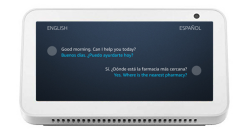How to Unlock Google Chrome's Experimental Tab Scrolling Early
A new tab-management feature is on its way to Chrome. You’ll need Chrome Canary to try out this new “tab scrolling” feature, but it’s worth the separa

Someone recently broke into my car two nights in a row. The first time I figured it was a slip up on my end, and that I forgot to lock it after I got home. So I made a point of locking it and arming the alarm the next night, and yet someone was able to break in again.
Luckily, nothing was stolen since there’s not much in the car, but of course it was still unsettling. No windows were smashed, either, so how the hell did someone manage to unlock the car without the keys? I figure since the car is new (we’ve only had it since April), it’s unlikely someone had a matching key.
Then a quick glance through the neighborhood Facebook groups and Nextdoor feeds revealed I’m not alone; similar break-ins are happening all over town, and many suggest the culprit is hacking key fobs. So I did some checking and quickly discovered key fob hacking is totally a thing. There are many techniques, but the most common is called “signal boosting.”
Unlike signal boosting important information on social media, the “boost” in this context means stealing a signal. Hackers can use a device that tricks the car and your key fob into thinking they’re within proximity of each other, then emit the fob’s unlock signal without touching any buttons on the fob or car.
Signal boosting is normally used to unlock a car, but a similar tactic can turn on vehicles with keyless ignitions, too. There are also other remote key fob hacks, such as rolljamming, that record and spoof your key fob’s unlock signal, though they’re much harder to pull off. But all that someone needs to perform a signal boost is about $20 of equipment.
So how do you prevent a signal boost attack? It’s not like you can activate two-factor sign-ins or install anti-malware on your key fob. The solution is actually pretty simple: block signals from reaching your key fob.
There are several ways to do this, but a Faraday bag is the most reliable. These bags create an electro-magnetic barrier that stops any signals from getting in or out of the bag, just like the “Faraday cages” the bags are named after.
You can buy inexpensive Faraday bags, boxes, and wallets online. Just put your keys (or other wireless devices you want to sequester) in the bag while you’re home, especially at night.
If you don’t have a Faraday bag, putting your keys in a thick metal object—like a refrigerator or a safe, for instance—would be better than leaving them out in the open, but we can’t promise it will block a hacker’s signal boosting as effectively as a Faraday bag. At the very least, keep your keys at the other end of your house while you’re at home. The further away your keys are from your car, and the more walls and other obstacles there are between them, the harder it will be for the signals to reach.
Couple a Faraday bag with other anti-theft measures like a steering wheel claw and security cameras, and the chances of someone breaking in and potentially stealing your car become much lower. Oh, and don’t keep spare keys, fobs, garage door remotes, or other valuables in your car. That way, if someone still manages to get in (windows are breakable, after all), they won’t find much to steal.

A new tab-management feature is on its way to Chrome. You’ll need Chrome Canary to try out this new “tab scrolling” feature, but it’s worth the separa

Amazon Echo devices can now work as your personal translator thanks to Alexa’s new Live Translate mode. Like the translation functions available from

Anime is the catch-all term for Japanese animation, but the medium is a global phenomenon with a passionate fan base outside of Asia. If you’ve never

If you want to contribute to the latest Bernie photo craze before the meme plays itself out—which will probably be sometime around the end of the week

Just because someone is getting up there in years, that doesn’t mean the should internet-connected world need leave them behind. Yes, even the silver-

When you’re wearing a mask outdoors, it becomes almost impossible to unlock your iPhone with Face ID. Technically, Face ID is doing its job—if you’re

Big Brother! 1984! Scary buzzwords! Look, it’s understandable why you’d be skeptical of big tech, especially when their products ask for more and more

It’s pretty unlikely that the noise level in your home is consistent. At any given time, there’s a mix of people talking and appliances running and so
We are a comprehensive and trusted information platform dedicated to delivering high-quality content across a wide range of topics, including society, technology, business, health, culture, and entertainment.
From breaking news to in-depth reports, we adhere to the principles of accuracy and diverse perspectives, helping readers find clarity and reliability in today’s fast-paced information landscape.
Our goal is to be a dependable source of knowledge for every reader—making information not only accessible but truly trustworthy. Looking ahead, we will continue to enhance our content and services, connecting the world and delivering value.